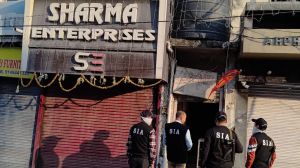Ration row deepens in Punjab as AAP, BJP trade charges over NFSA beneficiaries
While Punjab CM Bhagwant Mann has accused the Centre of conspiring to “snatch ration from the poor”, the Union government argues that the e-KYC verification was mandated by the Supreme Court and that states decide inclusion.
 At the time the AAP government came to power, Punjab had about 1.43 crore beneficiaries. (Express Photo)
At the time the AAP government came to power, Punjab had about 1.43 crore beneficiaries. (Express Photo)Punjab’s ongoing tussle over ration entitlements under the National Food Security Act (NFSA) has escalated into a full-blown political row. Since the Aam Aadmi Party (AAP) government took charge in March 2022, the number of NFSA beneficiaries in the state has seen major variations.
At the time the AAP government came to power, Punjab had about 1.43 crore beneficiaries. By early 2023, this number rose sharply to 1.57 crore, well over the Centre’s limit of 1.41 crore. This triggered a massive verification drive, during which nearly 13 lakh ineligible beneficiaries were struck off, bringing the figure down to 1.41 crore.
However, ahead of the Lok Sabha polls, the state restored 10.77 lakh names pending a fresh survey, pushing the count to nearly 1.53 crore. Currently, the Ministry of Consumer Affairs maintains that Punjab’s eligibility remains capped at 1.41 crore beneficiaries, which is almost 46 per cent of the state’s population. Union minister Pralhad Joshi recently said, “1.41 crore people will continue to get ration. Not even a single name has been struck.”
Chief Minister Bhagwant Mann, however, has launched a direct attack on the Centre, accusing it of conspiring to “snatch ration from the poor.” In a letter to the people, posted on X, Mann alleged, “They are striking off 23 lakh people by saying e-KYC is pending, while another 32 lakh by saying they are not poor and hence not eligible. This way, they are snatching ration from 55 lakh families.” AAP spokesperson Neel Garg went further, branding BJP as “ration chor.”
The Centre, on the other hand, argues that the e-KYC verification was mandated by the Supreme Court and that states, not the Centre, decide inclusion or exclusion. It has also granted Punjab three extensions to complete the process.
Punjab BJP chief Sunil Jakhar joined the debate, accusing Mann of “misleading” Punjabis. Jakhar clarified that the Centre had not cancelled any ration cards and reminded that it was the AAP government that ordered the cancellation of 10.5 lakh ration cards in 2023, only to reverse the decision later.
Jakhar also accused the ruling party of governance failures, pointing to figures like 8 lakh pending driving licence cases, 12.5 lakh farmers excluded from PM-Kisan, and 35 lakh elderly without health coverage, along with Rs 250 crore dues to private hospitals under the state government’s Mukh Mantri Sehat Bima Yojana.
The confrontation comes amid another flashpoint — the BJP’s ongoing welfare outreach camps, which the AAP government has blocked, accusing the party of illegal data collection and potential fraud. The Punjab Police have initiated probes into this, while BJP leaders, including Jakhar, were detained during the drives.
Jakhar slammed these detentions as a “murder of democracy” and vowed to continue the campaign. The party, under the banner of ‘BJP de sewadar aa gaye ne tuhade dwaar’, claims it is informing people of central schemes, while the AAP calls it a cover for data theft and commission-based malpractice.
The row has taken a sharp political edge, with both sides trying to claim the pro-poor mantle. For the AAP, the narrative is that the BJP wants to deprive the poor of food security, while the BJP argues that the AAP is hiding mismanagement behind populist rhetoric and is not allowing the poor to get the benefit of central government’s schemes. What makes the debate interesting is the underlying statistic— if Mann’s figures are correct, nearly 50 per cent of Punjab’s population now qualifies for ration under NFSA.
“That raises a worrying question: in a state which is considered the nation’s bread basket, this shows unequal distribution of the society within. Moreover, the government’s freebie policy never allows people to work hard, and that may also be the reason for increased beneficiaries,” said Kuldip Singh, retired assistant professor, Department of Education, Punjabi University, Patiala.
Prof Ronki Ram, a sociologist, however, said: “If the number of beneficiaries has increased, that necessarily doesn’t mean that poverty has increased. However, the population of Punjab has also increased. In addition, many names struck in previous years might have been included and the e-KYC of many also seems to be pending.”







